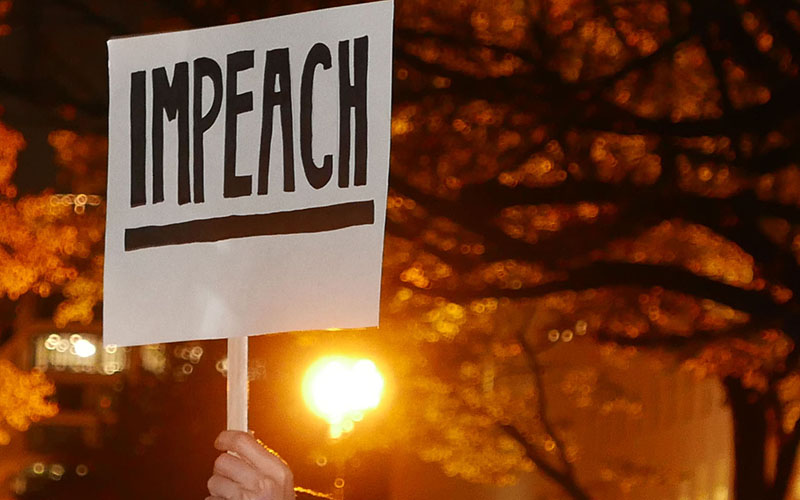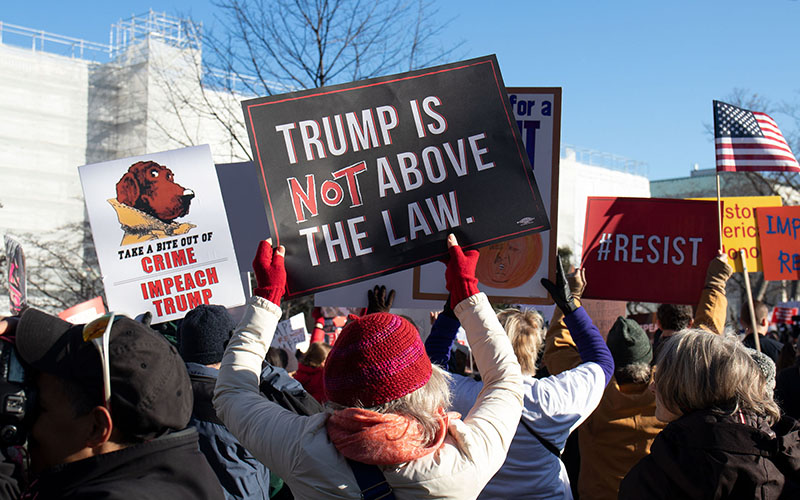
Impeachment supporters got their wish, as the House voted to impeach President Donald Trump. But impeachment is expected to fail in the Senate. (Photo by Kara Harris/Cronkite News)
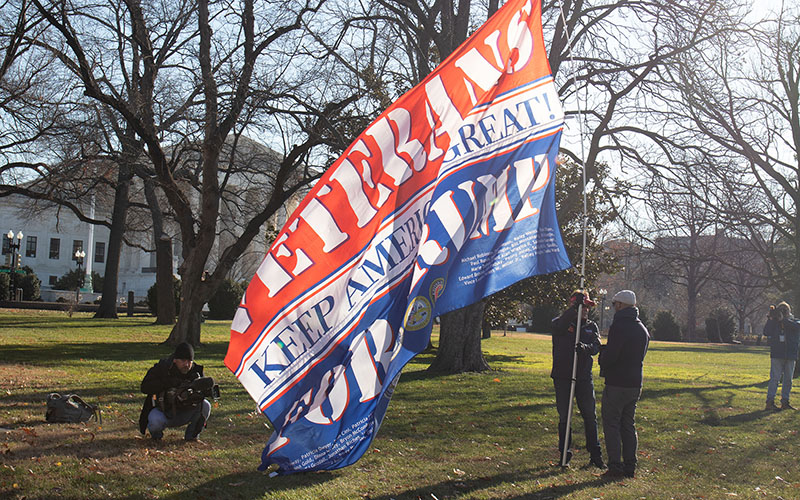
President Donald Trump’s supporters were outnumbered Wednesday outside the Capitol, but they were no less visible than his opponents. (Photo by Kara Harris/Cronkite News)
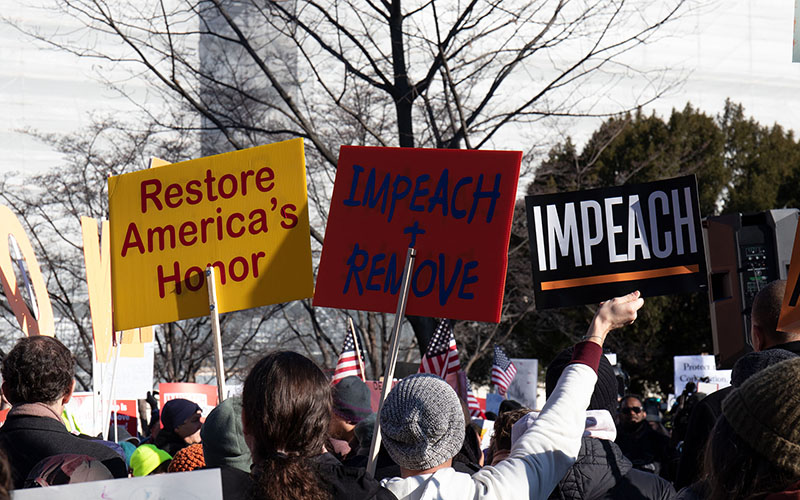
Several hundred protesters gathered on Capitol Hill to urge impeachment of President Donald Trump as the House prepared to vote on the issue. (Photo by Kara Harris/Cronkite News)
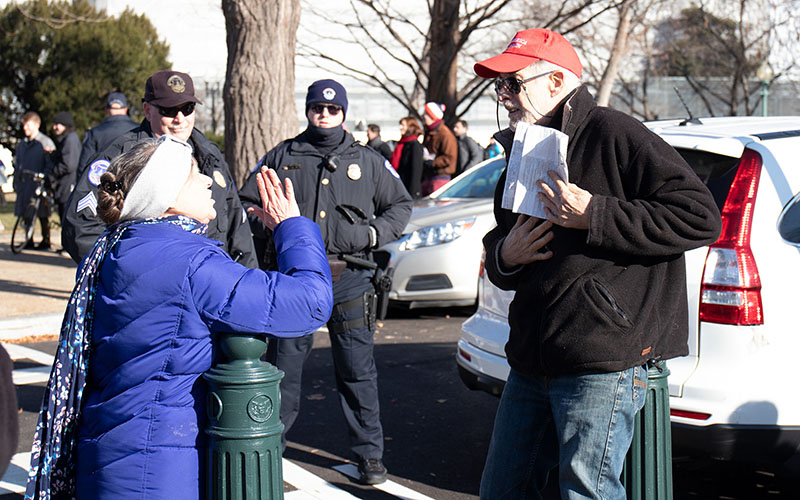
An impeachment supporter and opponent square off outside the Capitol Wednesday morning as House members were beginning a day of debate on impeachment. (Photo by Kara Harris/Cronkite News)
WASHINGTON – Arizona lawmakers split along party lines Wednesday as the House took a historic vote to impeach President Donald Trump, making him just the third president to be impeached and the first while facing re-election.
After months of hearings and a daylong debate, the House voted 230-197 to find Trump guilty of abuse of power and voted 229-198 to find that he obstructed Congress’ investigation of him.
Just a handful of Democrats and Republicans crossed the aisle for the final votes on the impeachment resolution, but in Arizona all five Democrats supported both articles of impeachment and all four Republicans opposed them.
The action now moves to the Republican-controlled Senate, which few expect will be able to muster the two-thirds majority that would be needed to remove Trump from office. Hearings in the Senate are not expected to begin until after the first of the year.
Wednesday’s vote followed almost 11 hours of sometimes emotional debate that appeared to change few minds in the sharply divided House. Republicans argued that Trump’s actions did not rise to an impeachable level, while Democrats said he had clearly abused his authority and obstructed Congress.
Rep. Debbie Lesko, R-Peoria, insisted on the House floor that there is “no proof, none, that the president has committed an impeachable offense.”
“I have spent hours and hours and hours reading transcripts, looking at documents, hearing testimony,” said Lesko, who is a member of the Judiciary Committee that forwarded the articles of impeachment. “And I can tell you one thing – I believe this is the most unfair, politically biased, rigged process that I have seen in my entire life.”
But Rep. Raul Grijalva, D-Tucson, said he voted for impeachment because “the facts are irrefutable” and “shameful.”

One opponent of President Donald Trump made his opinion known during a rally outside the Capitol on Wednesday. (Photo by Kara Harris/Cronkite News)
“The underpinnings for impeachment are real and historic,” Grijalva said on the House floor. “Trump has subverted the rule of law, abused his power and engaged in a cover-up.
“The president leaves us no choice but to vote to impeach so we can protect our democracy and correct the damage that’s already done,” he said.
The vote comes almost 21 years to the day after the House voted to impeach then-President Bill Clinton, who later survived Senate votes to remove him from office.
It also came less than three months after House Speaker Nancy Pelosi called for a formal impeachment inquiry to investigate a White House whistleblower’s concerns over Trump’s July 25 call with the new Ukrainian president.
In that call, Trump asks President Volodymyr Zelensky to “do us a favor” and investigate the son of former Vice President Joe Biden, a Democrat who could be a Trump challenger in the 2020 election. He also asked Zelensky to investigate claims that Ukraine, not Russia, interfered in the 2016 U.S. election.
Testimony from diplomats and White House officials said Trump conditioned a meeting with Zelensky on an announcement of an investigation by Ukraine. Almost $400 million in U.S. military aid to help the Ukrainians deter Russian aggression was also delayed.
Those formed the basis of the first impeachment article, the abuse of power by Trump to benefit his campaign. The second impeachment article, obstruction of Congress, came as a result of Trump’s refusal to turn over documents or to let administration officials appear before the congressional committees investigating the reports.
Republicans were quick to point out that the money to Ukraine was ultimately released and Zelensky has said he did not feel pressured in his talks with Trump.
“The facts are unchanged,” said Rep. Andy Biggs, R-Gilbert. “The Ukraine received aid that they were promised.”
Biggs and other Republicans repeatedly attacked Democrats for what they called the rushed nature of the impeachment process, the first hearings of which were held behind closed doors. He called it a “partisan, vindictive, dishonest” process.
Those comments echoed Trump himself who, in a remarkable six-page letter to Pelosi on Tuesday, said it was not foreign powers but Democrats who are “interfering in America’s elections. You are the ones subverting America’s democracy.”
“Any member of Congress who votes in support of impeachment – against every shred of truth, fact, evidence and legal principle – is showing how deeply they revile the voters and how truly they detest America’s constitutional order,” he said in the letter, which called the impeachment “nothing more than an illegal, partisan attempted coup.”
But Grijalva said that no amount of “misdirection, lies, disinformation, tantrums and cries of victimization by Trump and others can undo” his actions.

Rep. Ann Kirkpatrick, D-Tucson, said her decision to vote for impeachment was not an easy one to make, but that the evidence convinced her that she had to do it. (Photo by Kara Harris/Cronkite News)
Democrats took pains Wednesday to say they were not voting for impeachment lightly – or gladly. But many, like Rep. Ann Kirkpatrick, D-Tucson, said the evidence convinced them it was the right thing to do even though it’s “really divided our country.”
“I’m a former prosecutor, I wanted to see the evidence,” Kirkpatrick said. “I got the Mueller Report, started reading through it and realized he definitely has done things that violate the law and are impeachable offenses.”
Rep. Tom O’Halleran, D-Sedona, had likewise cited his career as a police officer for the need to proceed cautiously, but said the evidence made up his mind. Trump “violated the Constitution and put our national security, our international relationships, and the integrity of our elections at risk,” he said in a statement, adding that not voting for impeachment would “set a dangerous precedent.”
But Republicans said Democrats were only out to get Trump and were not interested in the evidence. Lesko called it a “sham … rigged from the start,” noting that a majority of Democrats on the Judiciary and Rules committees had voted to move forward on impeachment on July 17, “before President Trump’s call event took place.”
In a statement after the vote, White House press secretary Stephanie Grisham called the vote “one of the most shameful political episodes in our nation’s history,” but said Trump is “confident that he will be fully exonerated” by the Senate.
Kirkpatrick was not ready to give up on the Senate.
“It will be interesting to see what happens, I think a lot of it depends on what kind of evidence there is,” she said. “I don’t think we can assume one way or the other how they are going to vote.”

